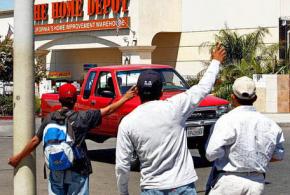Legalizing exploitation
In an article written for the Indypendent, , president of Day Laborers United, explains that proposed new work permits are an instrument of exploitation.
I AM an undocumented day laborer in Queens who has worked in this country for almost 20 years. I do hard, dangerous jobs on construction sites--such as demolition or carrying out the trash--when I can get any work at all. I have known many men who have been killed in workplace accidents or who have become gravely ill from breathing in dust due to a lack of adequate protective equipment.
We deserve the chance to become full members of the society we contribute to every day. For the past decade, I have heard much in the media about a possible immigration reform law. But I have learned not to believe it.
In the early 2000s, there was talk of the United States and Mexico reaching a comprehensive deal to legalize all undocumented immigrants in return for a free-trade deal that would allow private investment in Pemex, Mexico's state-owned oil company. Those talks fell apart after 9/11.
During his 2004 re-election campaign, President George W. Bush once again raised hopes of immigration reform to woo the Latino vote, but it was an empty promise.

In 2006, we went out into the streets by the millions and our demands continued to be ignored.
President Barack Obama won the Hispanic vote in 2008 by promising that in his first 100 days as president, he would put forth comprehensive immigration reform. Once in office, he said he was too busy dealing with the economic crisis to work on immigration reform.
Today, in Obama's second term as president, we hear the same promise of humane and comprehensive immigration reform.
But I don't see it. As far as I can tell from what is being discussed, we are being asked to accept a process toward legalization that would take 10 to 15 years. The only thing being offered is a simple guest worker permit similar to what we already have with the H-2A and H-2B visas.
FAR FROM being a solution, work permits are instruments of exploitation for immigrant workers on both sides of the border. In immigrants' countries of origin, unscrupulous brokers collect large fees promising to help arrange work permits and then disappear with people's money. On this side of the border, the bosses expose the workers to long, hard hours of labor in unhealthy conditions and without necessary protections. If the workers don't like it, they can lose their jobs--and their work permits.
Creating a new set of work permits without a real path to permanent residency and citizenship will only legalize the exploitation we live under while requiring us to go to "the back of the line" and pay thousands of dollars in fines and more taxes for the privilege of being treated this way.
The Senate's bipartisan "Gang of Eight" (which includes New York Sen. Chuck Schumer) may think they are fooling us. But I can't swallow this deception. And I suspect there are many others like me among the 11 million undocumented people in this country who understand what is being proposed and will have no motivation to come "out of the shadows" to participate in this process.
The distrust that I feel comes from observing two successive presidential administrations, one Republican and the other Democrat. They speak from both sides of their mouth. From one side, they spew words of legalization, but on the other side, they generate more anti-immigration laws, increase deportations, build detention centers and jails, and pour more investments into policing the border.
I am over 45 years old, as are many of the people I work with in construction. And it appears increasingly likely that we will not live long enough to be legalized. This is unjust. After almost two decades in this country, there are a couple of things I have learned: firstly, don't trust the politicians, and secondly, it will only be through our own ability to organize and collectively fight for our rights that we will see improvements in our lives.
First published at the Indypendent. Translated by Gustavo Medina.


